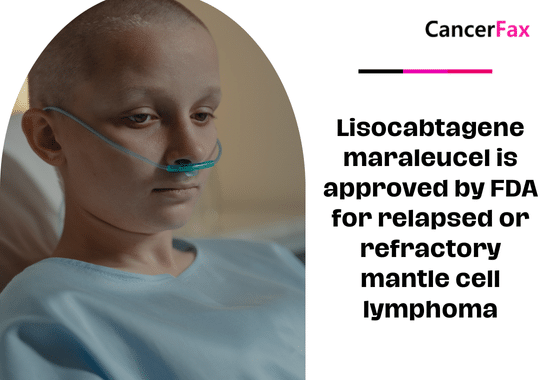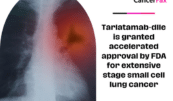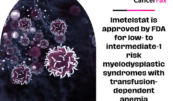Lisocabtagene maraleucel is approved by FDA for relapsed or refractory mantle cell lymphoma
May 2024: The Food and Drug Administration has granted approval to lisocabtagene maraleucel (Breyanzi, Juno Therapeutics, Inc.) for the treatment of adult patients with relapsed or refractory mantle cell lymphoma (MCL) who have undergone at least two previous rounds of systemic therapy, which includes the use of a Bruton tyrosine kinase inhibitor (BTKi).
The efficacy of the treatment was assessed in a clinical trial called TRANSCEND-MCL (NCT02631044). The study looked at adult patients with relapsed or refractory MCL who had already tried at least two types of treatment, such as a Bruton tyrosine kinase inhibitor, an alkylating agent, and an anti-CD20 drug. The trial was open-label, multicenter, and single-arm in design.
People with an ECOG performance rating of 1 or lower, a history of autologous and/or allogeneic hematopoietic stem cell transplantation, and a history of central nervous system lymphoma were eligible for the trial. There was no predetermined limit for blood counts. Patients were allowed to participate in the study, provided the investigator determined that they had sufficient bone marrow function to take lymphodepleting treatment.
Patients were administered a solitary dose of lisocabtagene maraleucel within a time frame of 2 to 7 days after the conclusion of lymphodepleting chemotherapy, consisting of fludarabine (30 mg/m2/day) and cyclophosphamide (300 mg/m2/day) administered concurrently for a duration of 3 days. The primary efficacy analysis involved 68 patients with mantle cell lymphoma (MCL) who had received at least two previous lines of treatment, including a BTK inhibitor.
These patients had PET-positive disease either at the beginning of the study, or after receiving bridging therapy. They were given the intended dose of the treatment and were followed up for at least six months from the date of their initial response.
The overall response rate (ORR) was the percentage of patients who had either a complete response (CR) or a partial response (PR) after getting an infusion of lisocabtagene maraleucel. It was used as the main measure of how well the treatment worked. An independent review committee (IRC) used the 2014 Lugano classification to make this determination.
The Independent Review Committee (IRC) determined that the rate of complete response (CRR) and the length of the response (DOR) were additional indicators of effectiveness. The overall response rate (ORR) was 85.3%, with a 95% confidence interval (CI) ranging from 74.6% to 92.7%. The complete response rate (CRR) was 67.6%, with a 95% CI ranging from 55.2% to 78.5%. The median duration of response (DOR) was 13.3 months (95% confidence interval [CI]: 6.0, 23.3) after a median follow-up of 22.2 months (95% CI: 16.7, 22.8).
The predominant nonlaboratory adverse events, occurring in at least 20% of cases, included cytokine release syndrome (CRS), exhaustion, musculoskeletal discomfort, encephalopathy, edema, headache, and decreased appetite. The FDA has granted approval to lisocabtagene maraleucel, along with a risk evaluation and mitigation strategy, due to the potential for severe or life-threatening cytokine release syndrome (CRS) and neurologic toxicities.
The optimal dosage for lisocabtagene maraleucel is between 90 and 110 million CAR-positive viable T cells, with an equal proportion of CD4 and CD8 components.
Susan Hau is a distinguished researcher in the field of cancer cell therapy, with a particular focus on T cell-based approaches and cancer vaccines. Her work spans several innovative treatment modalities, including CAR T-cell therapy, TIL (Tumor-Infiltrating Lymphocyte) therapy, and NK (Natural Killer) cell therapy.
Hau's expertise lies in cancer cell biology, where she has made significant contributions to understanding the complex interactions between immune cells and tumors.
Her research aims to enhance the efficacy of immunotherapies by manipulating the tumor microenvironment and exploring novel ways to activate and direct immune responses against cancer cells.
Throughout her career, Hau has collaborated with leading professors and researchers in the field of cancer treatment, both in the United States and China.
These international experiences have broadened her perspective and contributed to her innovative approach to cancer therapy development.
Hau's work is particularly focused on addressing the challenges of treating advanced and metastatic cancers. She has been involved in clinical trials evaluating the safety and efficacy of various immunotherapy approaches, including the promising Gamma Delta T cell therapy.
- Comments Closed
- June 20th, 2024






B-cell malignancy breakthrough, Breyanzi for MCL, CAR-T for mantle cell lymphoma, CD19-targeted CAR-T, FDA-approved lymphoma therapy 2024, Lisocabtagene maraleucel approval, R/R MCL treatment, Relapsed MCL options
CancerFax is the most trusted online platform dedicated to connecting individuals facing advanced-stage cancer with groundbreaking cell therapies.
Send your medical reports and get a free analysis.
🌟 Join us in the fight against cancer! 🌟
Привет,
CancerFax — это самая надежная онлайн-платформа, призванная предоставить людям, столкнувшимся с раком на поздних стадиях, доступ к революционным клеточным методам лечения.
Отправьте свои медицинские заключения и получите бесплатный анализ.
🌟 Присоединяйтесь к нам в борьбе с раком! 🌟